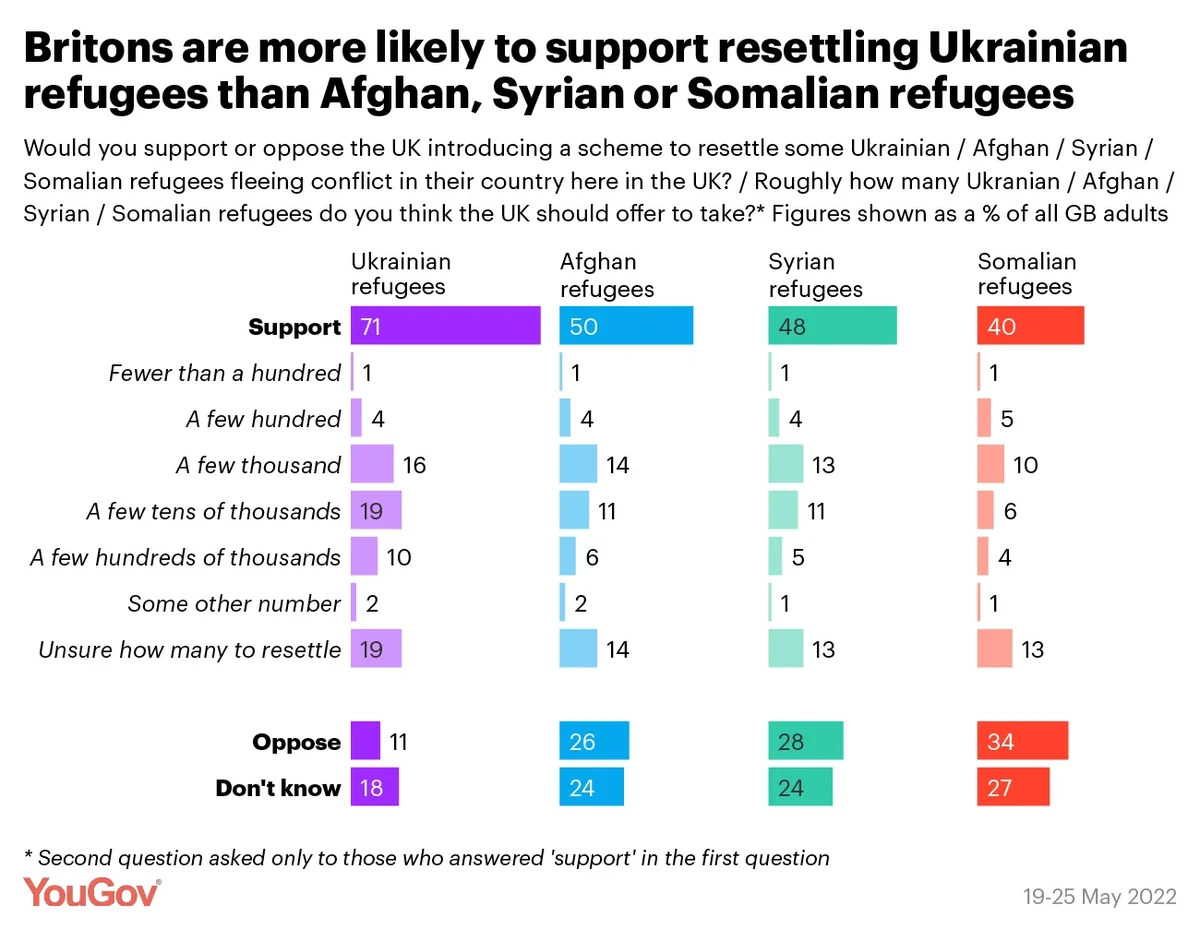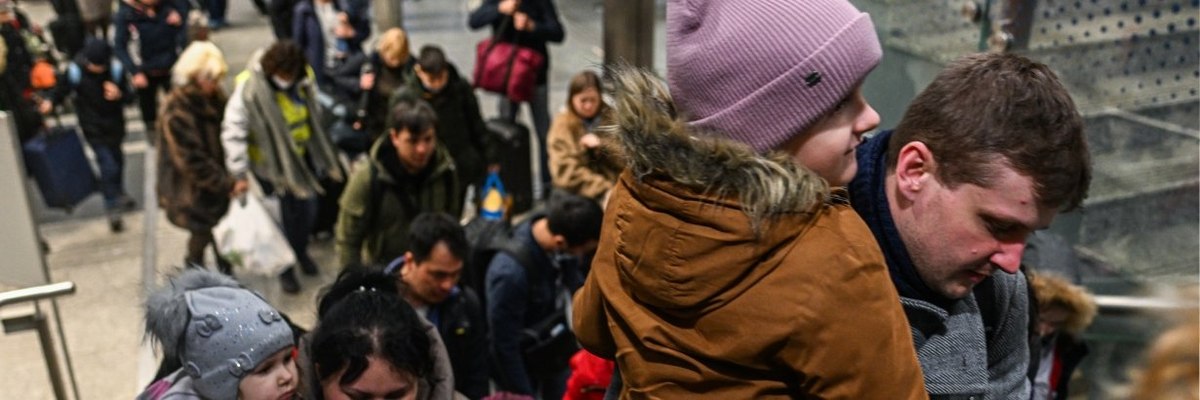YouGov study shows opinion towards Ukrainian refugees is warmer than towards those fleeing warzones in Afghanistan, Syria and Somalia
The Russian invasion of Ukraine and subsequent displacement of millions of Ukrainians created yet another major international refugee crisis. Ukraine has now joined countries like Syria, Afghanistan, Somalia, South Sudan, Myanmar and Venezuela, citizens of whom make up over half of the world’s displaced population.
The British public responded to the conflict in Ukraine with extraordinary willingness: tens of thousands signed up to share their homes with Ukrainians fleeing conflict, and previous YouGov polling shows that British citizens want the government to do more to help Ukrainian refugees.
But the media coverage of the Ukrainian refugee crisis, including references to Ukrainians being “civilized” and “European people, with blue eyes and blond hair”, have prompted accusations of a double standard. Do Britons’ warm attitudes towards displaced Ukrainians extend to refugees fleeing conflict in other countries?
YouGov asked the British public their willingness to help refugees, with respondents shown a series of questions about either Ukrainian, Afghan, Syrian or Somalian refugees (the specific nationality being selected at random).
The research reveals that the British public feel less generous and more morally conflicted about refugees from Afghanistan, Syria and Somalia, compared to Ukraine, with Conservative voters particularly likely to take a harder stance on refugees from these countries.
Support for resettling refugees fleeing conflicts in Afghanistan, Syria and Somalia is lower than support for resettling displaced Ukrainians
Seven in 10 (71%) Britons would support a scheme to resettle some Ukrainian refugees in the UK – with a figure equivalent to three in 10 Britons (29%) saying the country should take in at least “a few tens of thousands” of displaced Ukrainians. This is a drop on previous polling from early March, when 42% said the same.
Even though support for taking in large numbers of Ukrainian refugees appears to be waning, the British public are nevertheless more likely to support offering asylum to Ukrainians over refugees fleeing conflicts in other parts of the world. Half of the public (50%) would support resettling Afghan refugees, while 48% would support a scheme to resettle displaced Syrians and just 40% would support the same for Somalian refugees.

The public are also more reluctant to take in higher numbers of Afghan, Syrian and Somalian refugees: 16%, 15% and 10% respectively would take in at least “a few tens of thousands” of refugees from these countries, half as many as would take in the same number of Ukrainians.
Conservative voters are as likely as the wider public on support for resettling Ukrainian refugees (71%), with Labour voters are more in favour of such a scheme (82%). But Conservative voters do not show anything like the same levels of support for resettling refugees from other conflicts, while Labour voters’ support, although lower, is still a majority for all four countries asked about. Just 37% of Conservative voters would support a scheme to resettle Afghan refugees, falling to 31% for Syrian refugees and 21% for Somalian refugees.
Britons feel less morally obliged to offer asylum to Afghan, Syrian and Somalian refugees than to Ukrainians
Six in 10 Britons (59%) say that the UK has a moral obligation to offer asylum to Ukrainian refugees, with a quarter (25%) thinking the country does not have such an obligation. When it comes to Afghanistan, Syria and Somalia, the public are more split about whether the country has a moral duty to shelter displaced refugees. Britons tend to believe that the UK has a moral obligation to resettle refugees from Afghanistan, by 44% to 37%, are split 39% to 41% on Syrians, and tend not to think the UK has a moral obligation to offer asylum to Somalian refugees (34% to 45%).
By 53% to 33%, Conservative voters feel that the UK does have a moral obligation to offer asylum to Ukrainians. However, as before, Tory voters feel the opposite way about refugees from conflicts in the Middle East and Africa. Just 29% of Conservatives feel that the UK has a moral duty to house Afghan refugees (with 56% saying the UK does not have such a duty), while 21% feel a moral obligation to resettle Syrians (and 65% do not) and just 14% feel the same duty about Somalians (with 69% not feeling any moral responsibility).
Labour voters, on the other hand, are much more likely to feel that the country has a moral obligation to take in refugees from all four countries asked about in our survey: 76% for Ukraine, 71% for Afghanistan, 60% for Syria and 60% for Somalia.
The British public see refugees from conflicts in the Middle East and Africa as more of a threat to the UK than Ukrainians
Broadly speaking, Britons do not see refugees from any of the countries asked about in our survey as a threat to the UK. However, the public is much more likely to see Middle Eastern and African refugees as threatening: 22-25% see Afghan, Syrian and Somalian refugees as a threat to the country, compared to just 5% who feel the same about Ukrainians. For refugees from Afghanistan, Syria and Somalia, there is also a higher degree of uncertainty: between 29-35% answering ‘don’t know’ when asked whether refugees from these countries are a threat to the UK, compared to 18% who are unsure about Ukrainian refugees.
As before, Conservative voters are much more likely to have negative attitudes towards refugees from the Middle East and Africa. Four in 10 Tory voters (40%) see refugees from Somalia as a threat to the UK (compared with just 10% of Labour voters who feel the same), 37% see Afghan refugees as a threat and 38% have this view about Syrian refugees. Aa with the wider public, just 5% of Conservative voters see Ukrainian refugees as a threat to the county.
Does perception of refugee numbers affect attitudes to refugees?
Compared to the other countries asked about in our survey, the Ukrainian refugee crisis is comparatively very young. Syrians have been fleeing violence in their country since May 2011, while Somalians have faced unrest for over 30 years and Afghans for over 40 years.
Consequently, refugees from Syria, Somalia and Afghanistan have been seeking asylum in the UK over many years – although despite this, the 70,000 Ukrainian refugees granted visas by the UK over the last few months dwarfs the number of Syrian refugees granted asylum in the UK since the beginning of the crisis (5,102), and is already approaching the total number of Afghan refugees resettled (around 79,000 as of 2019). According to UN refugee statistics, as of 2020, the number of Somalian refugees settled in the UK is 132,000.
Does the warmth shown towards displaced Ukrainians reflect a broader attitude to refugee numbers? Even those who consider there to be a ‘very high’ or ‘fairly high’ number of Ukrainian refugees in the UK still support resettling more (47%), and the same pattern of reduced generosity towards Middle Eastern and African refugees is present among those who perceive there to be a ‘very high’ or ‘fairly high’ number of refugees in the UK from these countries.
A quarter of those who think there are many Afghan refugees in the UK (26%) support resettling more, while a similar number (27%) of those who think there are many Syrians in the UK would support a resettlement scheme. For Somalian refugees, just 18% of those who think there are many in the UK would support granting asylum to more.
Likewise, those who think there are lots of Ukrainian refugees in the UK are more willing to admit further large numbers compared to those who believe there are high numbers of Afghans, Syrians or Somalians.
Three in ten (31%) of those who think there are already large numbers of Ukrainian refugees in the UK are willing to admit “a few thousand”, “a few tens of thousands” or “a few hundreds of thousands”. For the other nationalities, this figure stands at only 10-15%.
Part of this appears to be down to the fact that Ukrainian refugees are not seen as a threat by those who think there are many in the UK, in stark contrast to the other refugee nationalities. Just 16% of those who say there are a lot of Ukrainian refugees in the UK see them as a threat. By contrast, those who perceive there to be many Somalian, Syrian or Afghan refugees in the UK are much more likely to see these people as a threat, at 57%, 51% and 48% respectively.











